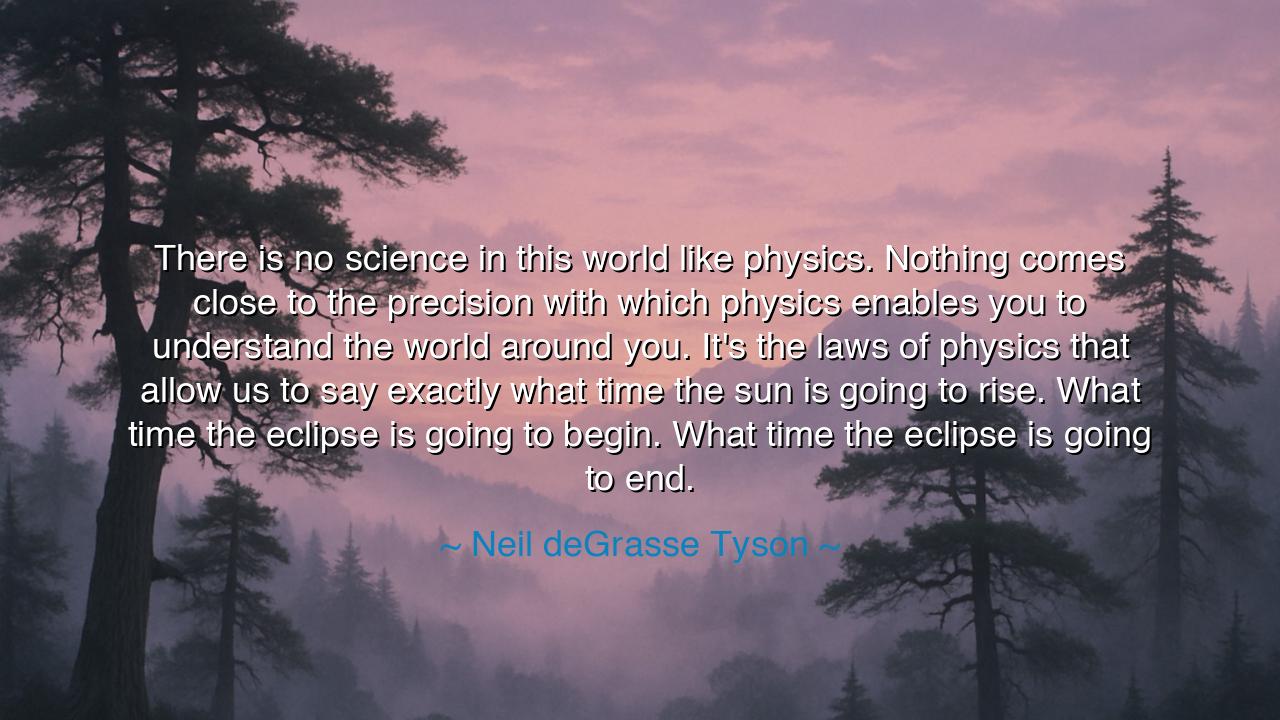
There is no science in this world like physics. Nothing comes
There is no science in this world like physics. Nothing comes close to the precision with which physics enables you to understand the world around you. It's the laws of physics that allow us to say exactly what time the sun is going to rise. What time the eclipse is going to begin. What time the eclipse is going to end.






“There is no science in this world like physics. Nothing comes close to the precision with which physics enables you to understand the world around you. It's the laws of physics that allow us to say exactly what time the sun is going to rise. What time the eclipse is going to begin. What time the eclipse is going to end.” Thus proclaims Neil deGrasse Tyson, the herald of the cosmos, whose words carry both the awe of wonder and the strength of reason. In this declaration, he raises physics above all other sciences, not to diminish their worth, but to remind us of the extraordinary gift it offers: the power to know with certainty, to predict with precision, to peer into the deep order woven into the universe.
The origin of this truth lies in the long labor of humankind. The ancients gazed at the heavens and trembled before the mysteries of sun and moon. To them, an eclipse was an omen, a terror, a sign of divine wrath. Kings made sacrifices, priests offered prayers, and the people cowered in fear. But through centuries of observation and reasoning, from Babylonian astronomers to the genius of Kepler and Newton, the hidden patterns were revealed. What once seemed the caprice of gods became the laws of physics—regular, reliable, eternal. And now, as Tyson exclaims, we may foretell the exact moment when the shadow will fall and the exact instant when it shall depart.
Consider the story of Edmond Halley, who, in the seventeenth century, applied Newton’s new laws to the path of a comet. He predicted that the comet of 1682 would return in 1758, long after his own death. And though he did not live to see it, his prediction proved true. The heavens, once the realm of superstition, had yielded to precision. This was not mere guesswork, nor prophecy, but the triumph of physics—the ability to gaze into the future of the cosmos with accuracy. What greater testament could there be to the power Tyson celebrates?
Yet the greatness of physics lies not only in its ability to predict the sky but also to master the earth. Bridges stand because their weight is calculated, rockets fly because their trajectories are known, electricity flows because its laws are measured. To walk in a modern city is to live inside a cathedral of physics, every light, every engine, every device a testimony to the unseen laws that bind the universe. Where other sciences reveal the richness of life, it is physics that lays the foundation, the ground upon which all others stand.
But Tyson’s words also carry a deeper resonance. He reminds us that precision is not the enemy of wonder but its companion. To know the exact time of sunrise does not rob it of beauty; it deepens it, for it shows that the universe is not chaos, but cosmos—order and harmony written into its very fabric. The eclipse is no longer a terror, but a marvel we may prepare for, gather for, and behold with awe. In this way, physics liberates us from fear and grants us the dignity of understanding.
The ancients would have called this the unveiling of the divine order. For what is more sacred than to discover that the universe is intelligible, that it speaks in a language of numbers and laws, and that human beings, fragile as we are, can read this language? This is why Tyson proclaims that no science is like physics: it is not only knowledge, but communion with the very bones of reality.
So, O listener, take this lesson into your heart: cherish the precision that physics gives, but let it awaken not arrogance, but humility and wonder. Do not cower before the unknown, but seek to know; do not surrender to superstition, but trust in the power of reason. In your own life, apply this wisdom: measure before you judge, observe before you act, understand before you fear. For as Tyson has taught, through physics we are no longer prisoners of ignorance but voyagers of truth, able to see the rising of the sun and the turning of the heavens not as mystery alone, but as the music of laws eternal.






AAdministratorAdministrator
Welcome, honored guests. Please leave a comment, we will respond soon